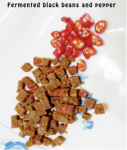
Hello Fellow Tea Chefs!
I am back with another an Chinese classic tea recipe with this special Wuyi Oolong tea:
Stir-Fried Leek Pork with Chives Moss, Fermented Black Bean Sauce and Wild Tea Qi Wuyi Golden Water Oolong Tea may have a peculiar name “Fried flies head” due to the black bean sauce resembling the heads of flies, but I assure you the taste is much better, and we don’t use any flies 🙂
With a spicy taste, this is a perfect dish with rice and Wuyi Golden Water Oolong Tea. This traditional Chinese tea recipe is very easy to cook in just a little time. I have found that the Wuyi Golden Water’s unique toasted & floral oolong taste pairs very well with the other flavors of this dish in order to create a sensational flavor that makes my mouth water every time. Over the years, I have tried using other oolongs but none get such a perfect match of flavors.
*Note: Some people may not like pork so there’s no problem if you want to go with other meat alternatives instead of pork.








5. Take 1-2 oz pot and put 1-1½ Tbsp or 3gm Wuyi Oolong tea. In 212°F hot water, brew the tea for about 1-2 minutes. Strain the tea liquid. Set aside wet tea leaves and tea liquid for use later.

6. Heat up 1 tablespoon oil in pan. Add marinated lean pork. Stir-fry over medium heat until without moisture, and then add black bean sauce. Stir-fry evenly.

7. Add chopped bell pepper, chopped chives moss and Wuyi Oolong tea leaves. Stir-fry over high heat.


8. Add salt to taste. Stir-fry evenly before dish out.

9. Pour some Wuyi Golden Water Oolong Tea liquid in the dish until the whole dish has more Wuyi Golden Water Oolong Tea

1. Wild Tea Qi Wuyi Golden Water Oolong:
2. Fermented Black Beans:
The presence of black beans in the sauce increases the anti oxidant quotient of the sauce. This sauce is low in fat content and is good source of vitamin A, calcium,iron and manganese. And since its pungent, tangy taste enhances food so uniquely, it can easily replace fattier condiment options such as mayonnaise, butters and sugary ketchups.
3. Chives:
Garlic and onions have received most of the attention for their allicin content, but chives are a notable source of this nutrient as well. Cathy Wong and Sabra Ricci reported in their book, “The Inside Out Diet,” that allicin might contribute to lower cholesterol and blood pressure, which improves your overall health, particularly that of your heart. Allicin aids in cholesterol management by reducing your LDL levels and increasing your HDL levels. This nutrient might also cut your blood pressure and prevent dangerous blood clots.
Chives might also help in the fight against cancer because they contain many antioxidants that help destroy free radicals and discourage the growth of cancerous cells and tumors. Wong and Ricci noted that chives help your body produce glutathione, an agent that enables your body to identify toxins and other cancer-causing substances and eliminate them.
Eating chives might help your body digest your food better and absorb more nutrients. Chives work by getting rid of bacteria, yeast and fungi in your intestinal tract so that your entire digestive system works as it should. Jean Ann Van Krevelen, Amanda Thomsen, Robin Ripley and Teresa O’Connor reported in their book, “Grocery Gardening: Planting, Preparing and Preserving Fresh Food,” that chives also have antibacterial capabilities that kill at least 30 strains of salmonella, which can cause intense digestive problems.
Adding a sprinkle of chives to a potato dish, bowl of soup, pasta recipe or tossed salad is a simple way to do something small for your health. Just 1 tbsp. of chives supplies many vitamins and minerals, including 9 mg of potassium, 3 mg of calcium, 78 mcg of beta-carotene, 3 mcg of folic acid and 6 mcg of vitamin K. Chives also supply lesser amounts of magnesium, iron and trace amounts of several B vitamins.
Comments will be approved before showing up.